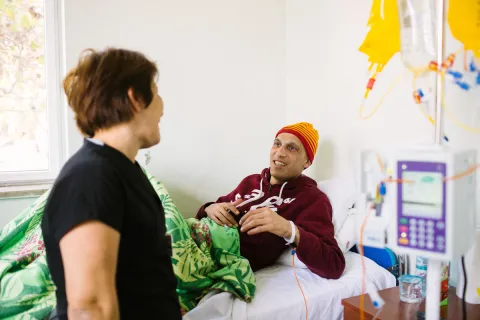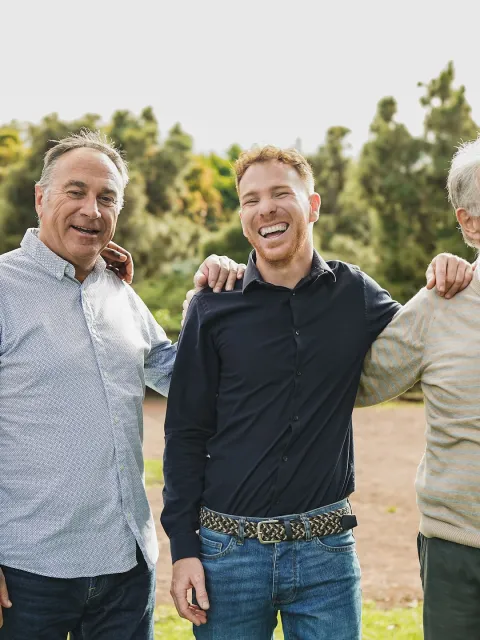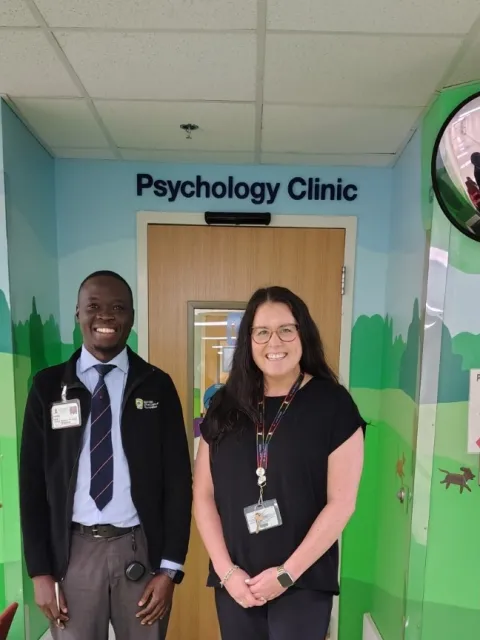Surviving cancer is a lifelong experience
Three women from UICC member organisations speak about their experience with cancer and how it led to improving cancer support services in their country.

Surviving cancer depends on a multitude of factors and not merely on how early the cancer was detected and its diagnosis, or the availability and quality of treatment. How a person living with cancer is treated as an individual and assisted physically and psychologically in navigating their “patient journey” – from the moment he or she is told that they have cancer – can also play a crucial role in bringing about a positive outcome.
Furthermore, cancer survivorship is not merely determined by the moment when treatment has ended, the patient is “in remission” and the presence of cancer cells in the body is non-existent or greatly reduced. Nor even after a period of five years cancer-free, when a patient is often considered ‘cured’. According to the National Cancer Institute in the US, a person is considered a cancer survivor “from the time of diagnosis, through the balance of his or her life”.
That patient is a person who will experience the effects of having lived with cancer for many years, as well as possibly face not only the spectre of a recurrence but also face financial difficulties, body scars, and other physical, social and psychological struggles. The experience of a cancer diagnosis can also be life-changing in enriching ways, offering insight into what a person truly values in life and realigning priorities.
Who better can understand the needs and assist a person living with cancer than a cancer survivor? Indeed, many go on to join volunteer organisations or found their own support groups. This is the case for three women from UICC member organisations, who speak out here about the “cancer journey” and how it can be improved: Bahija Gouimi, Founder and President of the Association des Malades Atteints de Leucémie (AMAL); Jacqueline Daly, co-founder of East Galway & Midlands Cancer Support and Secretary to the Board of the European Cancer Patient Coalition (ECPC); and Carmen Auste, CEO of Cancer Warriors Foundation (CWF).
The importance of the patient voice
Bahija Gouimi was diagnosed with leukemia in 2002 when she was pregnant with her third child. She lives in Morocco, in Marrakesh, a region where at the time, she says, “no one spoke about cancer no one spoke about illness.” She faced solitude, as the first person in her family to have cancer; discrimination, as a woman expected to care for her husband and children and who has now become a weight for them; and alarmism even on the part of the medical staff. “I was told there was no treatment, no medicine, that I only had a few years to live.”
Bahija fought, first to accept her situation and then to act. “Whether I was going to live or die, I wanted to leave a trace. And I had to take care of my new son. Alone at night in the hospital, I saw him and I saw life; he helped me survive.”
She had to travel between Marrakesh where she lived, Rabat where she was initially hospitalised and where her medical records were kept, and Casablanca for follow up consultations. She also travelled more than 1,000 km a month to acquire medication from Ceuta in Spain, oral chemotherapy that would ultimately help her defeat her cancer.
“Others may not be as fortunate as I was to have a husband who remained with me and supported me, or who had such an incredible doctor able to find treatment… The situation won’t improve if we don’t get the patient’s opinion.”
– Bahija Gouimi, Founder and President of the Association des Malades Atteints de Leucémie (AMAL)
While Bahija understood the inequity of facing a cancer diagnosis in a low-resourced setting, she felt that certainly more could be done to overcome her solitude, provide her with hope, and help in acquiring funds and medication. Six months after she was in remission, she attended her first patient group panel in Nice, France.
The need for compassion
Jacqueline Daly’s initial consultation with her General Practitioner in Ireland about an abnormal pink mark on her arm went very well: “He’s an amazing GP who both listens and hears what you say,” she said. Surgery was performed three days later to remove the mark and she heard nothing for several weeks, figuring that no news meant good news.
“Then one Friday evening I get a call from the doctor who had performed the surgery and he said, ‘Ms Daly you have malignant melanoma and must come to the hospital Monday morning for more surgery’. It was terrifying, and I couldn’t ask any questions because he had closed the call. The first thing that went through my head was ‘I am going to die’ and I prayed I’d be alive to see my son finish school.”
At the time, she was caring for her elderly mother and her brother was dying from cancer – he was the only one she could speak to, “the only one who could understand what I was going through.”
“Nobody should receive a cancer diagnosis over the phone. If you don’t have compassion in this field, then you shouldn’t be doing the job.”
– Jacqueline Daly, co-founder of East Galway & Midlands Cancer Support and Secretary to the Board of the European Cancer Patient Coalition (ECPC)
After her second surgery, she was once again left with no news and no follow up. Only two years later did she see a radiotherapist and was fully examined for any further signs of cancer.
Her husband is a prostate cancer survivor who, he and Jacqueline felt, was poorly treated and did not receive enough psychological support. “We had trouble finding someone with empathy who could actually help.”, said Jacqueline. “He suffered from depression and was even suicidal. So many of the side effects of having prostate cancer and of the treatment, such as erectile dysfunction and incontinence, are not talked about. There should be a whole network of support.”
Today, almost 15 years later, Mr Daly is trained as a psychotherapist and Jacqueline has grown East Galway & Midlands Cancer Support organisation to encompass a number of services crucial to improving a cancer patient’s journey and their chances of survival. These include complementary therapies such as reiki, reflexology, healing touch and oncology massages; counselling; physical activity in a gym; a transport system to bring patients for radiotherapy; breast, gynaecological, bowel and prostate cancer support groups; a holistic garden for meditation and a vegetable garden. All activities are done in coordination with and approved by the patient’s oncologist.
Inequity in healthcare due to poverty and geographical location
21 years ago, Carmen Auste’s son, James, was diagnosed with brain tumour – but only after travelling across the Philippines to seven different hospitals and ultimately the US. There too the diagnosis was initially inconclusive, even with a brain biopsy that caused hydrocephalus, until finally the brain tumour was detected and treatment could be begin. “I am lucky that we had resources, a credit card and my work as a consultant to the United Nations.”
In the US, James received stereostatic radiosurgery, or non-surgical radiation therapy using laser, a technology that was unavailable in the Philippines for a patient with the same condition that Carmen and James knew. “That person went blind because of the older form of radiation treatment. My son said, ‘for the grace of God, that could have been me.’”
James was 19 when he was diagnosed, and while he was treated as an adult in the US, able to make his own medical decisions unlike in the Philippines, Carmen says he felt he had had a childhood cancer. Upon his return to the Philippines, James visited the public hospital for children to see how he could help because he felt that “children were not dying of cancer but of poverty.”
He ultimately visited all the hospitals and wrote about his observations and the need to hold the government accountable. The first successful advocacy campaign for Cancer Warriors Philippines was obtaining free cancer medication for children in government hospitals. It started with chemotherapy for leukaemia and has expanded with the childhood cancer medicine act to include supportive medicines.
“At first, it was about saving lives. We moved on to support young adults and build a better future for them: providing support for education, finding work, scholarships, assisting those who get married or are pregnant. Science cannot help everyone, so we also have a psychosocial support programme for those who are in comfort care.”
– Carmen Auste, CEO of Cancer Warriors Foundation (CWF)
The organisation has also been successful in obtaining reduced prices of up to 70% for children cancer medicines at private hospitals and maintenance medicine. A special package is now available for parents that covers USD 10,000 for childhood cancer treatment and two-year maintenance, but sadly it is not well utilised, says Carmen. “The child cannot have been referred to from another hospital, so it is rarely applicable. Also, the package only covers low-risk cases, when many children cancers are high risk because of age and late diagnosis. This is where we are focusing our advocacy efforts.”
Patient empowerment
Financial aid, psychosocial support in the form of counselling or assistance in finding work, fighting stigma and discrimination, or simply arranging transportation so that a person can actually reach their healthcare facility – all these factors are essential in empowering a person living with cancer and allowing them to believe that cancer is curable and not a death sentence.
For each person, the inner journey is different. For Bahija, there was a strong presence and questioning about faith. For Carmen, there was the search for greater knowledge, to make informed decisions, echoed in Jacqueline’s experience, as well as the need for compassion and be treated as a human being first rather than “just another patient”. Through it all, what they express is a desire for people living with cancer to be empowered.
“There is a great need for support centres, safe places where people can go for information. Forget Dr Google. Globally we can do better. Good health is everyone’s right.”
– Jacqueline Daly, co-founder of East Galway & Midlands Cancer Support and Secretary to the Board of the European Cancer Patient Coalition (CWF)
Last update
Tuesday 08 June 2021
